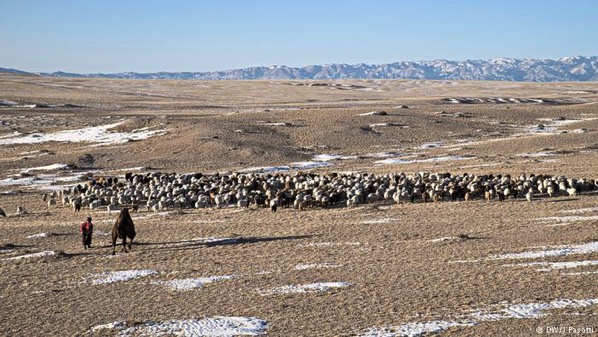How Mongolia's nomads are adapting to climate change
Harsh winters and dry summers are threatening the livelihoods of Mongolia's nomadic herders. Some are banding together to safeguard their herds - and communities - from the extreme conditions.
For centuries, nomadic families have driven their livestock across Mongolia's steppe, preserving a way of life that goes back generations. But changes in this vast, desolate landscape have forced them to adapt. Winters have become harsher, and extreme weather events more frequent.
Global warming is affecting Mongolia faster than other parts of the world. "Over the last 70 years, the average air temperature has risen by 2.1 degrees Celsius [3.8 degrees Fahrenheit] - one of the highest increases recorded on Earth
Mongolia is one of the last pastoral countries left on Earth. Its economy is dependent on the production of livestock, and around 80 percent of its territory is covered in grasslands. Living at the edge of the habitable world, pastoral nomadic people are highly vulnerable to changes. In response, some herders are forming communities and pooling their resources, in hopes that this will allow their traditional nomadic lifestyles to survive.
Around 28 percent of the Mongolian population lives at or below the poverty line, and many people survive on a subsistence basis. Because of this, and the fragile nature of pastures, extreme weather events are often disastrous in Mongolia. Experts are warning that pastures are at further risk due to overgrazing and climate change. A few centimeters more snow than average locks the forage under a thick frozen layer, and causes high mortality among the livestock.
Due to dzud, (a summer drought followed by a severe winter, generally causing serious loss of livestock) the winter of 1999 to 2000 resulted in the country losing 30 percent of its herds nationwide. As reported by Ulambayar in the scientific journal "World Development," 2 million head of livestock, or 20 percent of the national herd, were lost in the dzud of 2009. And dzud events are projected to increase due to climate change.
Many nomads are abandoning their traditional lifestyle and migrating to the cities. The capital of Mongolia, Ulaanbaatar, is already reeling under the impacts of rapid urbanization, which include off-the-charts air pollution.

No comments:
Post a Comment